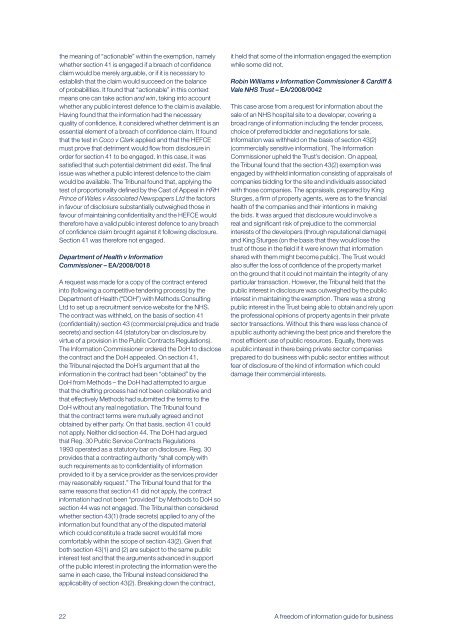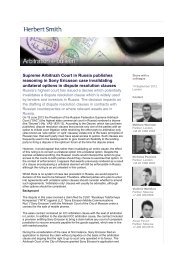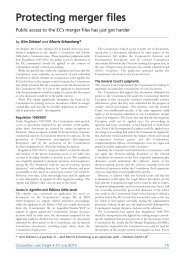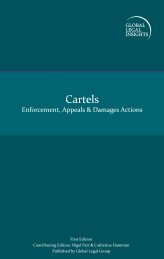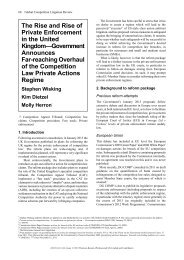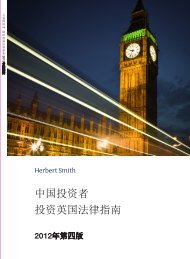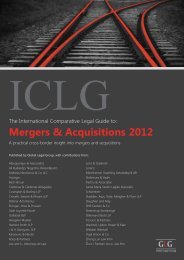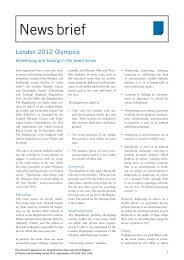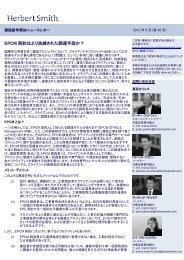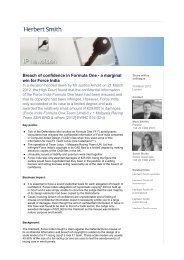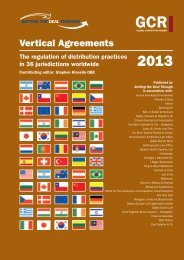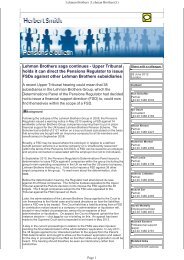Freedom of information: A guide for business - Herbert Smith Freehills
Freedom of information: A guide for business - Herbert Smith Freehills
Freedom of information: A guide for business - Herbert Smith Freehills
Create successful ePaper yourself
Turn your PDF publications into a flip-book with our unique Google optimized e-Paper software.
the meaning <strong>of</strong> “actionable” within the exemption, namely<br />
whether section 41 is engaged if a breach <strong>of</strong> confidence<br />
claim would be merely arguable, or if it is necessary to<br />
establish that the claim would succeed on the balance<br />
<strong>of</strong> probabilities. It found that “actionable” in this context<br />
means one can take action and win, taking into account<br />
whether any public interest defence to the claim is available.<br />
Having found that the <strong>in<strong>for</strong>mation</strong> had the necessary<br />
quality <strong>of</strong> confidence, it considered whether detriment is an<br />
essential element <strong>of</strong> a breach <strong>of</strong> confidence claim. It found<br />
that the test in Coco v Clark applied and that the HEFCE<br />
must prove that detriment would flow from disclosure in<br />
order <strong>for</strong> section 41 to be engaged. In this case, it was<br />
satisfied that such potential detriment did exist. The final<br />
issue was whether a public interest defence to the claim<br />
would be available. The Tribunal found that, applying the<br />
test <strong>of</strong> proportionality defined by the Cast <strong>of</strong> Appeal in HRH<br />
Prince <strong>of</strong> Wales v Associated Newspapers Ltd the factors<br />
in favour <strong>of</strong> disclosure substantially outweighed those in<br />
favour <strong>of</strong> maintaining confidentiality and the HEFCE would<br />
there<strong>for</strong>e have a valid public interest defence to any breach<br />
<strong>of</strong> confidence claim brought against it following disclosure.<br />
Section 41 was there<strong>for</strong>e not engaged.<br />
Department <strong>of</strong> Health v In<strong>for</strong>mation<br />
Commissioner – EA/2008/0018<br />
A request was made <strong>for</strong> a copy <strong>of</strong> the contract entered<br />
into (following a competitive tendering process) by the<br />
Department <strong>of</strong> Health (“DOH”) with Methods Consulting<br />
Ltd to set up a recruitment service website <strong>for</strong> the NHS.<br />
The contract was withheld, on the basis <strong>of</strong> section 41<br />
(confidentiality) section 43 (commercial prejudice and trade<br />
secrets) and section 44 (statutory bar on disclosure by<br />
virtue <strong>of</strong> a provision in the Public Contracts Regulations).<br />
The In<strong>for</strong>mation Commissioner ordered the DoH to disclose<br />
the contract and the DoH appealed. On section 41,<br />
the Tribunal rejected the DoH’s argument that all the<br />
<strong>in<strong>for</strong>mation</strong> in the contract had been “obtained” by the<br />
DoH from Methods – the DoH had attempted to argue<br />
that the drafting process had not been collaborative and<br />
that effectively Methods had submitted the terms to the<br />
DoH without any real negotiation. The Tribunal found<br />
that the contract terms were mutually agreed and not<br />
obtained by either party. On that basis, section 41 could<br />
not apply. Neither did section 44. The DoH had argued<br />
that Reg. 30 Public Service Contracts Regulations<br />
1993 operated as a statutory bar on disclosure. Reg. 30<br />
provides that a contracting authority “shall comply with<br />
such requirements as to confidentiality <strong>of</strong> <strong>in<strong>for</strong>mation</strong><br />
provided to it by a service provider as the services provider<br />
may reasonably request.” The Tribunal found that <strong>for</strong> the<br />
same reasons that section 41 did not apply, the contract<br />
<strong>in<strong>for</strong>mation</strong> had not been “provided” by Methods to DoH so<br />
section 44 was not engaged. The Tribunal then considered<br />
whether section 43(1) (trade secrets) applied to any <strong>of</strong> the<br />
<strong>in<strong>for</strong>mation</strong> but found that any <strong>of</strong> the disputed material<br />
which could constitute a trade secret would fall more<br />
com<strong>for</strong>tably within the scope <strong>of</strong> section 43(2). Given that<br />
both section 43(1) and (2) are subject to the same public<br />
interest test and that the arguments advanced in support<br />
<strong>of</strong> the public interest in protecting the <strong>in<strong>for</strong>mation</strong> were the<br />
same in each case, the Tribunal instead considered the<br />
applicability <strong>of</strong> section 43(2). Breaking down the contract,<br />
it held that some <strong>of</strong> the <strong>in<strong>for</strong>mation</strong> engaged the exemption<br />
while some did not.<br />
Robin Williams v In<strong>for</strong>mation Commissioner & Cardiff &<br />
Vale NHS Trust – EA/2008/0042<br />
This case arose from a request <strong>for</strong> <strong>in<strong>for</strong>mation</strong> about the<br />
sale <strong>of</strong> an NHS hospital site to a developer, covering a<br />
broad range <strong>of</strong> <strong>in<strong>for</strong>mation</strong> including the tender process,<br />
choice <strong>of</strong> preferred bidder and negotiations <strong>for</strong> sale.<br />
In<strong>for</strong>mation was withheld on the basis <strong>of</strong> section 43(2)<br />
(commercially sensitive <strong>in<strong>for</strong>mation</strong>). The In<strong>for</strong>mation<br />
Commissioner upheld the Trust’s decision. On appeal,<br />
the Tribunal found that the section 43(2) exemption was<br />
engaged by withheld <strong>in<strong>for</strong>mation</strong> consisting <strong>of</strong> appraisals <strong>of</strong><br />
companies bidding <strong>for</strong> the site and individuals associated<br />
with those companies. The appraisals, prepared by King<br />
Sturges, a firm <strong>of</strong> property agents, were as to the financial<br />
health <strong>of</strong> the companies and their intentions in making<br />
the bids. It was argued that disclosure would involve a<br />
real and significant risk <strong>of</strong> prejudice to the commercial<br />
interests <strong>of</strong> the developers (through reputational damage)<br />
and King Sturges (on the basis that they would lose the<br />
trust <strong>of</strong> those in the field if it were known that <strong>in<strong>for</strong>mation</strong><br />
shared with them might become public). The Trust would<br />
also suffer the loss <strong>of</strong> confidence <strong>of</strong> the property market<br />
on the ground that it could not maintain the integrity <strong>of</strong> any<br />
particular transaction. However, the Tribunal held that the<br />
public interest in disclosure was outweighed by the public<br />
interest in maintaining the exemption. There was a strong<br />
public interest in the Trust being able to obtain and rely upon<br />
the pr<strong>of</strong>essional opinions <strong>of</strong> property agents in their private<br />
sector transactions. Without this there was less chance <strong>of</strong><br />
a public authority achieving the best price and there<strong>for</strong>e the<br />
most efficient use <strong>of</strong> public resources. Equally, there was<br />
a public interest in there being private sector companies<br />
prepared to do <strong>business</strong> with public sector entities without<br />
fear <strong>of</strong> disclosure <strong>of</strong> the kind <strong>of</strong> <strong>in<strong>for</strong>mation</strong> which could<br />
damage their commercial interests.<br />
22 A freedom <strong>of</strong> <strong>in<strong>for</strong>mation</strong> <strong>guide</strong> <strong>for</strong> <strong>business</strong>


